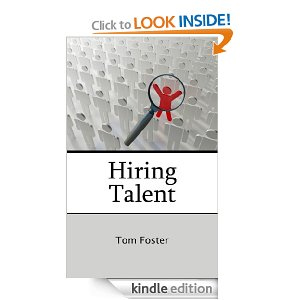It leaked out, cat’s out of the bag, no longer under the hat. Hiring Talent, the book, is now available for Kindle.
Hiring Talent, Decoding Levels of Work in the Behavioral Interview
Based on my classroom course and based on my online program, Hiring Talent is now available for download in the Kindle store. If you would rather hold the print version in your hand, you will have to wait a couple more weeks as it goes to press.
This is the only book on hiring that blends the research on levels of work with the discipline of behavioral interviewing. The research on levels of work, pioneered by the late Elliott Jaques, is powerful science. The discipline of behavioral interviewing is the most effective method for its application. This is the only book that puts these two ideas together in a practical framework for managers faced with the hiring decision.
On March 4, 2013, orientation starts for our next group in the online program based on this method. If you want more information, or if you would like to pre-register, follow this link – Hiring Talent – 2013.
